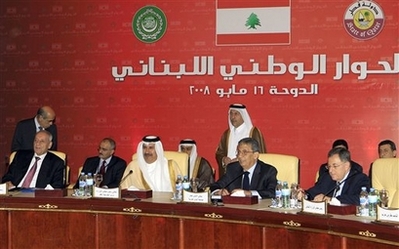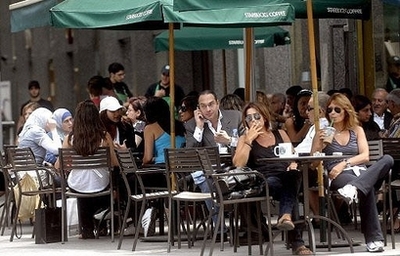Rival leaders appeared back at square one on the fourth day of intense bargaining in Doha but mediators managed to get the …
 Rival Lebanese leaders made progress on issues at the heart of their political crisis on Sunday but Qatari-mediated talks face major hurdles to a deal to pull Lebanon back from a civil war. Qatari Prime Minister Sheikh Hamad bin Jassim bin Jabr al-Thani met with members of th epro-government and opposition end a crisis that has paralyzed the government and left Lebanon with no president. But delegates said Sheikh Hamad had yet to win final approval on one of the prickliest issues on the agenda -- the shape of a new government -- after making several proposals including one to split seats three ways equally among rivals. A six-member committee created on Saturday to lay the framework for a new election law has made progress and was now working out the details of how to divide Beirut electorally. Delegates said Sheikh Hamad brought together Prime Minister Fouad Siniora and Parliament Speaker Nabih Berri, a senior opposition leader, for the first time in 18 months as part of efforts to solve the crisis that has left Lebanon with no president and taken it close to civil war. Delegates said the differences were slowly narrowing over the two key issues on the agenda -- a new election law and power-sharing in the government.
Rival Lebanese leaders made progress on issues at the heart of their political crisis on Sunday but Qatari-mediated talks face major hurdles to a deal to pull Lebanon back from a civil war. Qatari Prime Minister Sheikh Hamad bin Jassim bin Jabr al-Thani met with members of th epro-government and opposition end a crisis that has paralyzed the government and left Lebanon with no president. But delegates said Sheikh Hamad had yet to win final approval on one of the prickliest issues on the agenda -- the shape of a new government -- after making several proposals including one to split seats three ways equally among rivals. A six-member committee created on Saturday to lay the framework for a new election law has made progress and was now working out the details of how to divide Beirut electorally. Delegates said Sheikh Hamad brought together Prime Minister Fouad Siniora and Parliament Speaker Nabih Berri, a senior opposition leader, for the first time in 18 months as part of efforts to solve the crisis that has left Lebanon with no president and taken it close to civil war. Delegates said the differences were slowly narrowing over the two key issues on the agenda -- a new election law and power-sharing in the government.
The 14 political leaders in Qatar did not meet again after a first session on Saturday. Instead, a joint committee tasked with addressing an electoral law for a parliamentary poll due next year began work. "We are trying to resolve differences," opposition MP and committee member Ali Hasan Khalil told reporters. The factions differ on the delineation of constituencies, fearing they would lose parliamentary seats due to demographic changes which would follow any alteration of boundaries. Election laws have always been a sensitive subject in Lebanon, a patchwork of religious sects where redrawing constituencies can have a dramatic impact on voting results. A deal would lead to the election of army commander General Michel Suleiman as president. Both sides have accepted his nomination for a post reserved for a Maronite Christian in Lebanon's sectarian power-sharing system. "We are still leaving an opportunity because we still see the chance of reaching an understanding and this is what we came for," Hezbollah MP Mohammed Raad told his party's al-Manar TV. Former President Amine Gemayel said to reporters: "I think we have resolved 90 percent of the hurdles facing the new election law. We have some obstacles left regarding some electoral constituencies," said Amin Gemayel, a former president and member of the ruling coalition. "Hopefully, by evening we will have published a joint vision. We have to reach a solution in the end." Qatari Prime Minister Sheikh Hamad bin Jassim bin Jabr al-Thani had yet to win final approval on the shape of a new government but had made several proposals, including one to split seats three ways equally among rivals, delegates said. Secretary General Amr Moussa told Free Lebanon radio he expected "today to be a decisive day" at the Qatar talks that seek to end the 18-month political stalemate and facilitate the election of a president after a 6-month vacuum.
Please click read more for more pictures
DOHA – Rival leaders tackled divisive issues at the heart of Lebanon’s political crisis on Saturday at Qatari-mediated talks aimed at pulling …
 DOHA (Reuters) - Rival Lebanese leaders flew to Qatar on Friday aiming to end a protracted political conflict that has pushed the country to the brink of a new civil war.Qatar's Emir Sheikh Hamad bin Khalifa al-Thani was due to open the talks in a Doha hotel at 9:00 pm (1800 GMT). "Let us deal with matters calmly at the dialogue table. Each one of us and them must offer concessions to bury strife," Walid Jumblatt said during a tour of Druze villages. We are going to the dialogue with a great political wound," said Jumblatt, who later flew to Doha in a Qatar Airways plane along with both his allies and rivals. Lebanese forces leader Samir Geagea, former president Amin Gemayel and Druze leader Walid Jumblatt of the ruling coalition boarded a Qatari aircraft along with opposition member and parliament speaker Nabih Berri and the Free Patriotic leader Michel Aoun. The leader of the militant Shiite Hezbollah movement Sheikh Hassan Nasrallah did not go to Qatar, apparently for security reasons, but was to be represented by Hezbollah MP Mohammed Raad.
DOHA (Reuters) - Rival Lebanese leaders flew to Qatar on Friday aiming to end a protracted political conflict that has pushed the country to the brink of a new civil war.Qatar's Emir Sheikh Hamad bin Khalifa al-Thani was due to open the talks in a Doha hotel at 9:00 pm (1800 GMT). "Let us deal with matters calmly at the dialogue table. Each one of us and them must offer concessions to bury strife," Walid Jumblatt said during a tour of Druze villages. We are going to the dialogue with a great political wound," said Jumblatt, who later flew to Doha in a Qatar Airways plane along with both his allies and rivals. Lebanese forces leader Samir Geagea, former president Amin Gemayel and Druze leader Walid Jumblatt of the ruling coalition boarded a Qatari aircraft along with opposition member and parliament speaker Nabih Berri and the Free Patriotic leader Michel Aoun. The leader of the militant Shiite Hezbollah movement Sheikh Hassan Nasrallah did not go to Qatar, apparently for security reasons, but was to be represented by Hezbollah MP Mohammed Raad.
Arab mediators, led by the Qatari prime minister, concluded a deal on Thursday to end the fighting which killed 81 people and exacerbated sectarian tensions between Shi'ites loyal to Hezbollah and Druze and Sunni followers of the ruling coalition. "We are going to Doha .... to come back, God willing, with an agreement that will allow Lebanese to look forward, benefiting from the past and its bitter experience," Prime Minister Fouad Siniora said before leaving for Qatar.In another concession to the opposition, the ruling coalition also appears to have dropped its demands that the election of a new president precede discussions on a new cabinet and a new parliamentary election law -- the two main issues on the agenda of the Qatar talks. "The atmosphere is excellent and we will put our efforts into reaching a solution which is in the interest of all Lebanese," parliament speaker Nabih Berri, an opposition leader allied to Syria, told as-Safir.
The feuding Lebanese politicians agreed on Thursday to launch a dialogue as part of a six-point plan, following Arab League mediation led by Qatari Prime Minister and Foreign Minister Sheikh Hamad bin Jassem al-Thani. Under the deal the rivals undertook "to shore up the authority of the Lebanese state throughout the country," to refrain from using weapons to further political aims and to remove militants from the streets. It also called for the removal of roadblocks that paralysed air traffic and closed major highways, and for the rivals to refrain from using language that could incite violence. Life began returning to normal in Beirut on Friday as the port, businesses and many schools reopened. Syrian Foreign Minister Walid Muallem told Beirut's pro-opposition daily As-Safir that "Syria supports the agreement." He called it "a real opportunity to save Lebanon from the dangers it faces," but warned against "international interference that could have negative impacts." Lebanon's pro-government daily An-Nahar described the deal as "an achievement bordering on a miracle," although the country still remained on the brink. "Beirut's streets and airport returned to what they were before May 5, but this return does not mean the retreat of the explosive political situation." The pro-opposition newspaper Al-Akhbar said: "Those going to Doha today carry an immense patriotic duty in their hands. "Lebanon will be relieved of its leaders for a few days, but people are still worried about picking up the pieces of their lives as they are still under threat in the event the Doha meeting fails to bring a comprehensive solution." A group of disabled people, some bearing injuries from Lebanon's 1975-1990 civil war, gathered on the Beirut airport road bearing signs for the leaders: "If you don't agree, don't come back."
For more pictures please click READ MORE
Khazen History


Historical Feature:
Churches and Monasteries of the Khazen family

St. Anthony of Padua Church in Ballouneh
Mar Abda Church in Bakaatit Kanaan
Saint Michael Church in Bkaatouta
Saint Therese Church in Qolayaat
Saint Simeon Stylites (مار سمعان العامودي) Church In Ajaltoun
Virgin Mary Church (سيدة المعونات) in Sheilé
Assumption of Mary Church in Ballouneh
1 - The sword of the Maronite Prince
2 - LES KHAZEN CONSULS DE FRANCE
3 - LES MARONITES & LES KHAZEN
4 - LES MAAN & LES KHAZEN
5 - ORIGINE DE LA FAMILLE
Population Movements to Keserwan - The Khazens and The Maans
ما جاء عن الثورة في المقاطعة الكسروانية
ثورة أهالي كسروان على المشايخ الخوازنة وأسبابها
Origins of the "Prince of Maronite" Title
Growing diversity: the Khazin sheiks and the clergy in the first decades of the 18th century
Historical Members:
Barbar Beik El Khazen [English]
Patriach Toubia Kaiss El Khazen(Biography & Life Part1 Part2) (Arabic)
Patriach Youssef Dargham El Khazen (Cont'd)
Cheikh Bishara Jafal El Khazen
Patriarch Youssef Raji El Khazen
The Martyrs Cheikh Philippe & Cheikh Farid El Khazen
Cheikh Nawfal El Khazen (Consul De France)
Cheikh Hossun El Khazen (Consul De France)
Cheikh Abou-Nawfal El Khazen (Consul De France)
Cheikh Francis Abee Nader & his son Yousef
Cheikh Abou-Kanso El Khazen (Consul De France)
Cheikh Abou Nader El Khazen
Cheikh Chafic El Khazen
Cheikh Keserwan El Khazen
Cheikh Serhal El Khazen [English]
Cheikh Rafiq El Khazen [English]
Cheikh Hanna El Khazen
Cheikha Arzi El Khazen
Marie El Khazen